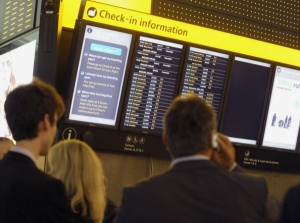Volcano fallout: how will it affect you?

With experts now predicting that the ash crisis could continue for months, what will be the effects on the travel industry, and the macro economy at large? Could it spark a double-dip recession, and what would our world be like without business travel, foreign holidays or air freight?
How long will the volcano remain active?
Eyjafjallokull last blew its lid in December 1821, and the eruptions continued for over 12 months. According to vulcanologists, eruptions of this kind are self-limiting – eventually, the volcano releases enough lava to calm down. However these eruptions are not particularly large and not particularly violent, meaning they can trickle on for months or even years. If this continues on Eyjafjallokull – and the winds keep blowing toward Europe – planes could be continue to be grounded.
What can be done about it?
Nothing but wait – it is a classic case of Mother Nature reminding you who is in charge, and that she must run her course.
Can we expect another Krakatoa?
The Eyjafjallokull eruptions are fairly tame but there are worrying signs of them getting bigger. The greatest concern however is that the eruptions, and accompanying earth tremors, will spark off the larger and more dangerous neighbouring volcano of Katla.
The last major eruption of Katla, in 1918, was ten times larger than this eruption of Eyjafjallokull. Vulcanologists believe the dust cloud from such an eruption would cause far greater disruption.
ADVERTISEMENT
Why don’t planes reroute around the cloud?
Calls are intensifying to lift the no-fly ban, as the cost of lost business soars and initial test flights through the danger zone were said to be “perfect”.
But volcanic ash has an abrasive effect on turbine blades and other moving parts, with possibly fatal consequences.
What’s the effect on airlines?
Airlines globally are losing $200 million, according to IATA. These losses are not sustainable in an industry still reeling from the recession, hence the call for a reassessment of the ban.
If the eruptions continue for weeks or even months, then several airlines are expected to collapse, and the industry is already calling for governments to offer banking style bailouts.
What other industries are in jeopardy?
The knock-on effects are sparking fears that it will tip the economy into a double-dip recession.
Ten of thousands of ground staff that support the UK and northern Europe’s airports are unable to work – from flight engineers and car park attendants to hotel staff and taxi drives, the knock-on effects are immense.
Who are the winners?
Business that move people and freight by sea and land rather than by air – cross channel ferries such as SeaFrance and P&O, high-speed train operator Eurostar, plus car-shuttle operator Eurotunnel.
P&O took a record 6,000 foot passengers across the Channel on Friday compared to the 100 to 200 it would expect at this time of year. Eurostar services are heavily booked, with 50,000 more passengers than normal since the airspace closures on Thursday. The company says travellers must book in advance rather than just turning up.
Europe’s largest coach operator, Eurolines has limited availability to and from the 500 European destinations across its vast network, and has put 100 extra coaches into service to and from the UK. It plans to add thousands more extra seats over the next two days. So far extra services have only been added to its key routes, between London and Dublin, Paris and Amsterdam. Deutsche Bahn has also reported a surge in bookings as travellers scramble for air alternatives.
Will travel insurance cover it?
With millions stranded abroad and millions more holiday plans in the balance, many travel insurance firms have refused to compensate them because their policies often state they do not cover natural disasters.
What about food supplies?
African farmers who rely on air-freighted exports to Europe will be hit hardest. In Kenya 400 tons of flowers had to be destroyed this weekend. A whole array of perishable imports from Brazilian bananas to Israeli oranges will go to waste as long as the flight ban continues.
This will, inevitably, lead to shortages in Europe and eventual non-availability of these items and in the meantime prices will rise dramatically.
An estimated 30 percent of European exports and imports are freighted by air so the effects of no flights will be devastating – from engineer firms to IT suppliers, every strand of business will in some way be affected.

